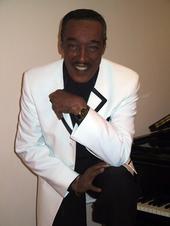Tommy Hunt has one hell of a reputation: renowned for his deeply rich and powerful voice-.-his sharp, hip and downright impossible dance routines-.-his spellbinding charisma-.-and his smooth way with the women. Throughout his long and fruitful career, he's worked in the US, Europe and the Middle East, recording an incredible repertoire throughout his travels from one continent to another. And though he never seduced the masses, he's beloved by the UK's Northern Soul fraternity, and is a much-cherished name on any soul weekender line-up.Hunts resum?©has grown at a steady rate throughout the years, having recorded for such labels as Chance, Sabre, Chess, Dynamo, Scepter, Atlantic, Capitol, Polydor, Pye and Spark. He worked with top New York producers and writers Leiber & Stoller, Luther Dixon, Teacho Wiltshire, Bacharach & David, Jerry Williams, Bert Keyes and Stan Green. And, in 1996 he was awarded a presitigious Rhythm and Blues society award in Los Angeles for his solo career and his early work with the Flamingos.
Born on the 18th June 1933 to Georgianna Derico, Tommy started his life as Charles James Hunt in Pittsburgh, Pennsylvania, USA.His earliest memories of his love for music were singing for family and his mothers’ friends at the age of 7.His school chums, who didn’t think he looked like a Charles, named him Tommy and it has stayed with him throughout his entire life.Music dominated his life and he was sent to reform school after spending his learning hours practising for and entering talent shows.He was released from reform school when he was 10, and his mother uprooted and moved to Chicago.He formed a group called the Five Echoes after a stint doing National Service in the Air Force and going AWOL, followed by a prison sentence when caught, but he sang his way out of jail and returned to Chicago to rejoin The Echoes.It was whilst performing in a club one night that he was approached by Zeke Carey of the Flamingos to join the group and temporarily take his place whilst he served his time in the Army.Tommy was a great asset to the group and was kept on after the guys returned. The Flamingos moved to New York and started to gain national recognition’There followed in 1958 their biggest hit ‘I Only Have Eyes For You’ for which the Flamingos are world renowned and it remains their most popular song, being used in Movies and on compilation discs to this date.Tommy left the group in 1960 due to differences, mainly because he was not Jewish as were all the other members with the exception of Nate Nelson. Within 3 days he was approached by Luther Dixon and released ‘Parade Of Broken Hearts’ which was slow to be picked up by the radio stations until one day in New York a deejay by the name of Jocko introduced the song and flipped it by mistake causing the phones to ring off the hook…That song was ‘Human’…Tommy’s biggest hit in the USA.Tommy became a regular performing at The Apollo in New York alongside all the 60’s greats such as Jackie Wilson, Marvin Gaye, Ray Charles, Diana Ross and the Supremes, The Shirelles, Dionne Warwick, Chuck Berry, & Sam and Dave, but to name a few. To the best of his knowledge Tommy remains the only person to have his photo framed twice in the Apollo foyer, both with the Flamingos and as a solo artist.Several years and a couple of minor hits later Tommy crossed the waters and sang for the U.S. Army in Germany and in 1969 having caught the travel bug left his homeland when the Beatles invaded America and travelled back to Germany, through Belgium and across the Channel to England. After several performances in the Theatre Clubs throughout the UK, Tommy sang for the 2nd Anniversary of the Wigan Casino and there followed the ladder of his success on the Northern Soul Scene.Tommy was approached by Russ Winstanly and Mike Walker of Wigan Casino fame and released several hits on Spark, firstly a cover version of a song formerly sung by his idol and biggest influence Roy Hamilton. The song was entitled ‘Crackin’ Up’. Followed by his chart success in 1976 ‘Loving On The Losing Side’.1982/83 saw him win the Male Vocalist of the Year, presented by the Club Mirror Award.With the decline of the Northern Soul Scene, Tommy’s shows dwindled and he hit the soul circuits further a field, moving to Amsterdam in 1986 and travelling the world with his soul shows. In 1996 the first of his recognitions came in the form of The Rhythm and Blues Foundation Lifetime Achievement Award for the Flamingos contribution to music.In 1997 Tommy moved back to England and embarked on a revived northern soul scene, experiencing all the love and dedication once again from the crowd who had never faltered in their love and appreciation for his music.The award for the Flamingos from the Vocal Group Hall of Fame came in 2000, followed by the Doo-Wopp Hall of Fame in 2001.The Crowing Glory of his career came also in 2001 when the Flamingos were inducted into The Rock and Roll Hall of Fame of America for their 30 year outstanding contribution to music.In latter years, having turned his hand to song writing, Tommy has penned his Autobiography which he hopes to have published and bring to you soon.Tommy still resides in England, and although doesn’t take on the workload he once did, still performs around the world as a special guest with the Flamingos and as a solo artist singing the songs he loves. He still brings the audience to their feet with his dynamic voice and impressive Tommy Hunt style.
